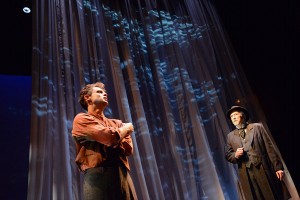“Welcome. Welcome to Vienna, the city of joy and gaiety. Of love and romance. The city of dreams. The year is 1910. On the eve of the Great War. On the eve of the end of the world.” And so begins Final Analysis, Otho Eskin’s award-winning play, now in repertory with Breakfast With Mugabe at The Alice Griffin Jewel Box Theatre.
Final Analysis, which takes place in the course of a single day in a Viennese coffee shop, focuses on the lives of some of Vienna’s most well-known residents: Sigmund Freud (Gannon McHale), the man who created a new science of the mind; Gustav Mahler (Ezra Barnes), one of the greatest composers and orchestral conductors of his era; Alma Mahler (Elizabeth Jasicki), his wife who would have love affairs with the leading artists of Vienna; and Ludwig Wittgenstein (Michael Satow), who dominated philosophical thought for half a century.
One of the most compelling scenes from director Ludovica Villar-Hauser features a conversation between the young Wittgenstein, and the elder Freud. Wittgenstein, contemptuous of the decaying society that surrounds him and disgusted by his own homosexual desire, has arrived at the point of hopelessness. And he sees no way out, no salvation.
Ludwig: "Our world is infected by a plague. That is the source of her hysteria, as you call it. Not some distasteful event in her childhood."
Freud: "Plague? What are you talking about? I’ve seen no reports of plague."
Ludwig: "Because it is silent. Invisible. Your science will not prevent annihilation — for her, for you, for all of us."
Freud: "That’s only coffee-house talk."
Ludwig: "Vienna is dying. The Empire is dying. Europe is dying. If you listen carefully, you can hear the death rattle of a dying world."
What I most enjoyed about this play were the deep philosophical questions which it asks about love, art, ethnic identity, and perhaps most interesting of all, hate.
Is hate love’s dark companion?
Eskin explores this question through the character of the Young Man played excellently by Ryan Garbayo. This Young Man would go onto to be one of the twentieth century’s most reviled figures: Adolf Hitler (who lived in Vienna from 1909-1913).
The Young Man begins the play as a starving, but determined artist who tries to ingratiate himself to Vienna’s cultural elite. He attempts to sell his painting of Vienna’s cityscape to Alma Mahler; he tries to persuade Wittgenstein to invite him to one of his famous soirees; and he forces a disinterested Gustav Mahler to read the opening pages of his opera.
So what happens to this ambitious artist?
Alma laughs at him, refuses to buy, and declares that it may be his destiny to starve. Wittgenstein scoffs and treats the anti-Semitic Young Man with contempt. And the most crushing blow of all is delivered by Gustav Mahler, one of the Young Man’s artist heroes. What does Mahler think of his opera?
“This is worthless trash!” he says.
Soon after this rejection, the Young Man abandons his love of art and his grandiose artistic ambitions. “I wanted to be an artist, to create beauty — to do something that would make people remember me. But the world denies me my canvas and paints.”
Instead he chooses to embrace the hate that simmers inside him. “My hatred keeps me warm at night, feeds me when I’m hungry, keeps me company when I’m alone, gives my life purpose. So long as I can hold onto that rage, I can survive. I have something to live for. I can triumph.”



